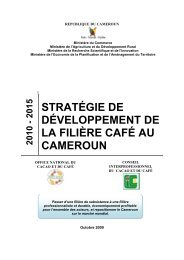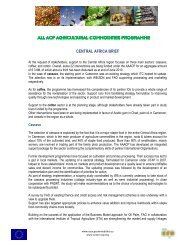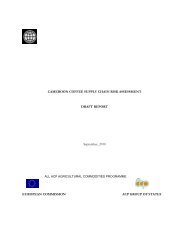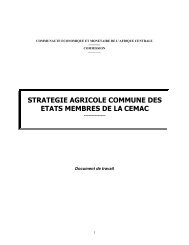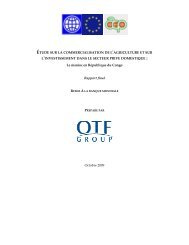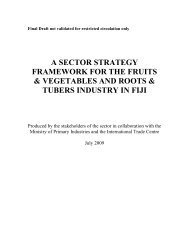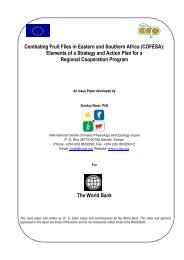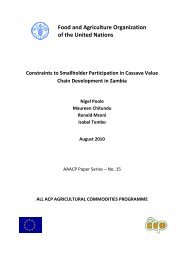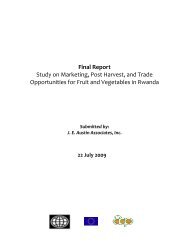Organization and Performance of Cotton Sectors in Africa ... - infoDev
Organization and Performance of Cotton Sectors in Africa ... - infoDev
Organization and Performance of Cotton Sectors in Africa ... - infoDev
You also want an ePaper? Increase the reach of your titles
YUMPU automatically turns print PDFs into web optimized ePapers that Google loves.
should eventually make a difference to the seed price, but currently they donot appear to account for enough <strong>of</strong> the market (or have enough work<strong>in</strong>gcapital) to push the price up significantly.Overall, a limited, but variable, degree <strong>of</strong> development <strong>of</strong> domestic oil <strong>and</strong>cake markets is observed. From the perspective <strong>of</strong> cotton g<strong>in</strong>ners, the ma<strong>in</strong> problemis the monopsony power exercised by oil processors <strong>in</strong> Burk<strong>in</strong>a Faso <strong>and</strong>Mali, as well as a lack <strong>of</strong> transparency <strong>and</strong> contestability on the transfer price <strong>of</strong>cotton seeds established through long-st<strong>and</strong><strong>in</strong>g arrangements between the cottoncompany <strong>and</strong> the oil processor—the latter <strong>of</strong>ten a subsidiary <strong>of</strong> the former—<strong>of</strong>ficially justified by the need to protect domestic <strong>in</strong>dustries. Nevertheless, oilconsumers may ga<strong>in</strong> at the expense <strong>of</strong> seed cotton producers <strong>in</strong> Burk<strong>in</strong>a Faso.Given the <strong>of</strong>ten tight marg<strong>in</strong>s obta<strong>in</strong>able from l<strong>in</strong>t production, moreresearch would be worthwhile on measures to improve the efficiency <strong>of</strong> themarkets for oil <strong>and</strong> cake. Accord<strong>in</strong>g to crude estimates <strong>of</strong> oil process<strong>in</strong>g costs,there are reasons to believe that many <strong>of</strong> the observed seed prices could beraised by additional competition. On the consumer side, this belief does raisea quality issue: oils from newer, smaller process<strong>in</strong>g units are typically lessref<strong>in</strong>ed than oils from larger, established companies. However, as long as basicfood safety requirements are met, it may well be that a significant proportion<strong>of</strong> poor consumers would will<strong>in</strong>gly accept lower quality oil if its price was alsolower. In this regard, there would appear to be parallels with the liberalization<strong>of</strong> maize markets <strong>in</strong> ESA <strong>in</strong> the 1980s, lead<strong>in</strong>g to rapid new entry <strong>of</strong> smallscalehammer mills <strong>in</strong> competition with established, large-scale roller mills(Jayne et al. 1995).The other major challenge for the regulation <strong>of</strong> liberalized oil markets is theenforcement <strong>of</strong> tariffs <strong>and</strong> other taxes on imported oils. <strong>Cotton</strong>seed oil producedlocally suffers <strong>in</strong> a number <strong>of</strong> <strong>Africa</strong>n countries from unfair competitionfrom massive imports <strong>of</strong> vegetable oils orig<strong>in</strong>at<strong>in</strong>g from Southeast Asia that are<strong>of</strong>ten imported fraudulently or without pay<strong>in</strong>g the full amount <strong>of</strong> legally duetariffs <strong>and</strong> taxes.CONCLUSIONThe analysis reveals that there are significant differences <strong>in</strong> the valorization<strong>of</strong> cotton seeds across the study countries. Burk<strong>in</strong>a Faso <strong>and</strong> Mali are l<strong>and</strong>locked,have a deficit <strong>in</strong> edible oil, <strong>and</strong> have strong dem<strong>and</strong> for cake fromtheir livestock sector, yet prices paid to cotton companies for seed are thelowest <strong>of</strong> the n<strong>in</strong>e countries because <strong>of</strong> monopsony power <strong>in</strong> the oil sectors,whether public or private. In contrast, Ug<strong>and</strong>a’s competitive oil sector makesa significant contribution to g<strong>in</strong>n<strong>in</strong>g company pr<strong>of</strong>itability as a result <strong>of</strong> thehigh prices paid for cotton seed. Small-scale <strong>in</strong>vestment <strong>in</strong> Tanzania has alsoled to more attractive prices for cotton seed. Similar <strong>in</strong>vestment is start<strong>in</strong>g totake place <strong>in</strong> Mali <strong>and</strong> should not be discouraged.VALORIZATION OF SEED COTTON BY-PRODUCTS 103



